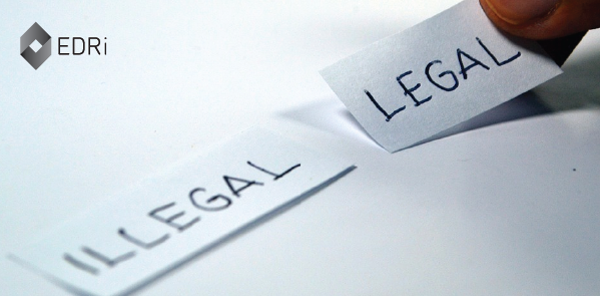Proposed Copyright Directive – Commissioner confirms it is illegal
At a meeting of the European Parliament Committee on Legal Affairs (JURI) on 19 June, European Commission Vice-President Andrus Ansip made a statement that was both shocking and shockingly honest. He advertised the content filtering product of the US company Audible Magic as an affordable alternative to Google’s Content ID filtering technology for filtering European citizens’ uploads to the internet.
He explained, entirely incorrectly, that the cost of “Audible Magic” – for an internet hosting company of unspecified size and unspecified activities – was “only 400 bucks”. This is not only a tiny fraction of the actual cost, but also a fraction of the amount in the Commission’s own impact assessment, 900 Euro. That, in turn, is only a fraction of the services fees listed on the website of “Audible Magic”, which is only a fraction of the real costs shown by a study on shortcomings of content detection tools.
Commissioner Ansip, also entirely incorrectly, gave the impression that the obligation in the Copyright Directive to filter content only applies to audio or audiovisual content. In reality, the obligation to filter all uploads covers everything that can be protected by copyright – also contents such as text and pictures or other protected works.
The confirmation of the real meaning of the Copyright Directive contradicts much of the work of copyright lobbyists, who have been “explaining” to the European Parliament that the Commission proposal does not require filtering or monitoring of citizens’ communications.
However, the most important point is that Ansip explicitly admitted that Audible Magic would enable the providers to fulfil their obligations under Article 13 of the proposed Directive. In the Scarlet/Sabam case, the Court of Justice of the European Union (CJEU) explicitly prohibited a legal requirement for internet access providers to use Audible Magic, on the basis that it would be a breach of the right to privacy, of the freedom to conduct a business, and of the freedom to receive and impart information. The Court worried in particular about the reduction of the right to use copyright exceptions and limitations.
In the Netlog/Sabam case, the CJEU again looked at mandatory filtering, this time for a hosting service (a social network). It again ruled that this kind of obligation for filtering uploads was not acceptable, with reasoning that was broadly identical to the Scarlet/Sabam case.

The question now is, in whose benefit is it to have a Directive that is demonstrably illegal? It hardly helps rightsholders to have a Directive that won’t survive court scrutiny, and it certainly does not help citizens. The only benefit might be for the Commission’s ambition to coerce internet companies into “voluntary” privatised law enforcement measures – legal uncertainty is a blunt but effective tool to make the providers “an offer they can’t refuse”.
Video: Why is the EU Commission pushing for illegal copyright filtering?
https://youtu.be/zROqxBFqe_k
There are some things money can’t buy. For everything else, there’s Audible Magic! (21.06.2017)
http://copybuzz.com/analysis/things-money-cant-buy/
Proposal for a Directive of the European Parliament and of the Council on copyright in the Digital Single Market (14.09.2016)
http://ec.europa.eu/transparency/regdoc/rep/1/2016/EN/1-2016-593-EN-F1-1.PDF
Deconstructing the Article 13 of the Copyright proposal of the European Commission, revision 2
https://edri.org/files/copyright/copyright_proposal_article13.pdf
Copyright reform: Document pool
https://edri.org/copyright-reform-document-pool/
Scarlet v SABAM: a win for fundamental rights and Internet freedoms (30.11.2011)
https://edri.org/edrigramnumber9-23scarlet-sabam-win-fundamental-rights/
SABAM vs Netlog – another important ruling for fundamental rights (12.02.2012)
https://edri.org/sabam_netlog_win/
(Contribution by Joe McNamee, EDRi)


